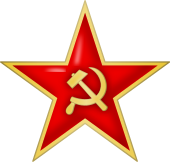This is an old revision of this page, as edited by Alkari (talk | contribs) at 00:29, 15 March 2007 (Restored information that was lost in recent reverting, plus a few stylistic changes (see talk)). The present address (URL) is a permanent link to this revision, which may differ significantly from the current revision.
Revision as of 00:29, 15 March 2007 by Alkari (talk | contribs) (Restored information that was lost in recent reverting, plus a few stylistic changes (see talk))(diff) ← Previous revision | Latest revision (diff) | Newer revision → (diff)
| Soviet Armed Forces |
|---|
 |
| Components |
| Ranks of the Soviet Military |
| History of the Soviet Military |
The military ranks of the Soviet Union were those introduced after the October Revolution of 1917. At that time the Imperial Russian Table of Ranks was abolished, as were the privileges of the dvoryanstvo (the pre-Soviet nobility).
Immediately after the Revolution, personal military ranks were abandoned in favor of a system of positional ranks, which were acronyms of the full position names. For example, komdiv was an acronym of Division Commander, kombat stood for Battalion Commander, and so forth. These acronyms have survived as informal position names to the present day.
Personal ranks were reintroduced in 1935, and General ranks were restored in May 1940. The ranks were based on those of the Russian Empire, although they underwent some modifications. Modified Imperial-style rank insignia were reintroduced in 1943.
The Soviet ranks ceased to be used after the 1991 collapse of the Soviet Union, although the military ranks and insignia of the modern Russian Federation have been largely adopted from the Soviet system.
Rank Table
This table shows the rank structure in use shortly before the collapse of the Soviet Union, circa 1980–1991.
| Category | All-forces ranks | Deck Ranks | |
|---|---|---|---|
| Supreme Officers or General Officers | (Генерали́ссимус Сове́тского Сою́за) | ||
(Ма́ршал Совéтского Сою́за) |
(Адмира́л Фло́та Совéтского Сою́за) | ||
(Гла́вный Ма́ршал рода войск), Marshal of an arm (Ма́ршал рода войск), General of the Army (Генера́л А́рмии) |
(адмира́л фло́та) | ||
(генера́л-полко́вник) |
(адмира́л) | ||
(генера́л-лейтена́нт) |
(ви́це-адмира́л) | ||
(генера́л-майо́р) |
(ко́нтр-адмира́л) | ||
| Senior Officers or Field-Grade Officers | (полко́вник) |
(капита́н 1-го ра́нга) | |
(подполко́вник) |
(капита́н 2-го р́анга) | ||
(майо́р) |
(капита́н 3-го р́анга) | ||
| Junior Officers or Company-Grade Officers | (капита́н) |
(капита́н-лейтена́нт) | |
(ста́рший лейтена́нт) |
(старший лейтенант) | ||
(лейтена́нт) |
(лейтена́нт) | ||
(мла́дший лейтена́нт) |
(мла́дший лейтена́нт) | ||
| Under-Officers or Master Non-commissioned Officers | (ста́рший пра́порщик) |
(ста́рший ми́чман) | |
(пра́порщик) |
(ми́чман) | ||
| Non-commissioned Officers | (старшина́) |
(гла́вный корабе́льный старшина́) | |
(ста́рший сержа́нт) |
(гла́вный старшина́) | ||
(сержа́нт) |
(старшина́ 1-й статьи́) | ||
(мла́дший сержа́нт) |
(старшина́ 2-й статьи́) | ||
| Soldiers, Seamen and Airmen | (ефре́йтор) |
(ста́рший матро́с) | |
(рядово́й) |
(матро́с) | ||
Generalissimo of the Soviet Union
This rank was created for Josef Stalin on June 27, 1945, and he was the only person ever to hold it. It is sometimes regarded as an equivalent to the rank of General of the Armies of the United States or the North Korean Dae Wonsu.
Marshal of an arm
The ranks of Marshal of an arm and Chief Marshal of an arm were used in five Soviet military branches (the Air Force, Artillery, Tank Forces, Engineer Forces, and Signal Forces). These ranks were established in 1943 and were both equivalent to General of the Army, although they maintained precedence between each other.
Rank insignia
Army
Navy
See also
- Air Force ranks and insignia of the Russian Federation
- Army ranks and insignia of the Russian Federation
- Naval ranks and insignia of the Russian Federation
- History of Russian military ranks
External links
- Military Ranks of the Union of the Soviet Socialist Republics
- Anatomy of Army, Russian
- SOVIET MILITARIA, sells Soviet ranking insignia, etc.